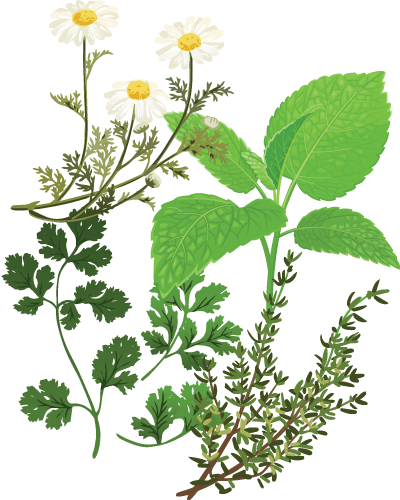
By Katherine Mashiak
Owner, Kassandra Herbs Unlimited
Editor’s Note: In this issue Prime welcomes Katherine Mashiak of Kassandra Herbs Unlimited as a recurring alternative medicine columnist! We look forward to the wealth of information Katherine, or Kassy, as she prefers to be called, will have to share with readers.
Welcome to Prime, Kassy!
My name is Katherine (Kassy) Mashiak. I have been studying herbs for over 40 years. I have a store, Kassandra Herbs Unlimited in Somers Connecticut. I want you to be able to enjoy the gifts of beauty and benefits that these wonderful plants offer us.
I think May is the perfect month to start planting herbs either in a container or in the garden. Plants that have been grown in a greenhouse may need to be protected from the cold nights that sometimes occur in May. All plants respond to temperature, especially of the soil, moisture, intensity of the sun and humidity. I will present four herbs which are easy and fun to grow and can support your good health.
Four herbs for good health
Here are my suggestions for an easy-to grow herb selection:
German Chamomile (Matricaria chamomilla) is an annual in our area. Plants germinate, flower, produce seed and die in one growing season. Seeds can be sown in pots or the ground in spring. The foliage is very fine and feathery. We use the blossoms for tea.
You harvest these small white flowers with a yellow center when they are fully opened and at the peak of perfection. Early morning after the dew has dried or evening before the dew has set. I dry them in a paper lunch bag. Once fully dried, store blossoms in a lidded glass jar away from sun and heat.
Chamomile is safe for adults and children unless one has an allergy to the Aster family. It is a calming herb that can aid digestion. It will help lower a fever and relieve mild pain. Not recommended during pregnancy. Tea drunk by a nursing mother may help colicky babies.
Make tea by infusion process. Pour 8 ounces of boiling water over a heaping teaspoon of herb and steep for 10 to 15 minutes. Drink or make extra tea and add to your bath.
Parsley (Petroselinum crispum) is a biennial which means it grows the first year and the second year flowers, seeds and dies. Once the plant sends up a flower stalk (bolts), the energy of the plant goes to flowering and producing seed and is no longer flavorful. This is why we plant new plants each year. Parsley can aid digestion and cleanse the palate between courses and is full of vitamins. So, eat your Parsley garnish!
An Infusion of the dried leaves can be enjoyed anytime. If using fresh leaves, use twice as much. This is a good rule of thumb for most herbs even in cooking. The properties of the herbs are usually more concentrated when dried. Butterflies love the flowers the second year.
Lemon Balm (Melissa officinalis) is a perennial herb which means it makes a repeat performance each spring. It is a great addition to any garden and is not invasive like other mints. The square stem is an indicator of which plants are in the mint family. The bees love the flowers and we need to plant more pollinator attractors.
Harvest the stems with leaves before the plant fully blooms. Tie in small bundles and dry with leaves downward in a cool dry place. Direct sun and heat will evaporate the volatile oils which provide the flavor, smell and benefits of the herb. When leaves are completely dry, remove from stems and store in a glass jar. Leaves and flowers stored properly will store for at least a year or until the next harvest is ready to jar up.
An infused tea made with the leaves can be calming, uplifting during the winter doldrums and has antiviral properties. Lemon Balm is generally safe for children. What a great idea for tea party! This herb should not be used by people with a low functioning thyroid (hypothyroidism).
Thyme There are so many varieties of thyme (Thymus spp.). Upright, creeping, lemon, French, English, German, red and pink to name a few, are all welcome additions to any garden space. They all have varied and excellent flavor as well as different structures and textures. Honey bees love the flowers. I have even harvested fresh Thyme from under early snow falls. Most varieties are perennials and some are used to fill in between stone walk ways.
A Mediterranean origin means most like well drained, even sandy soil. Infused tea has antiseptic properties and makes a great gargle for a sore or irritated throat. Is it any wonder that thyme oil has always been the most important ingredient in Listerine. Good tea for colds and flus and as well as an antiseptic cleaner.
Kassy welcomes questions about growing, harvesting, preserving and using herbs. Kassandra Herbs Unlimited, 54 Springfield Rd., Somers CT 06071 or telephone 860-749-0839.